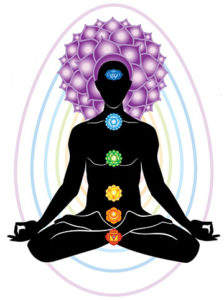 What does it mean when a scripture or spiritual teacher tells us to “mentally keep quiet?” It means to raise above your mind. When I did that, in that moment, I didn’t see all the differences, all the separateness. I saw only the unity in all of the diversity—the Oneness. In that state of mind, I didn’t see anything as a separate entity but only as one and the same. It was as if when you look at the ocean instead of seeing the waves you only see the great, vast ocean.
What does it mean when a scripture or spiritual teacher tells us to “mentally keep quiet?” It means to raise above your mind. When I did that, in that moment, I didn’t see all the differences, all the separateness. I saw only the unity in all of the diversity—the Oneness. In that state of mind, I didn’t see anything as a separate entity but only as one and the same. It was as if when you look at the ocean instead of seeing the waves you only see the great, vast ocean.
And when a student is ready to experience the depth of the meaning of the words, “mentally keep quiet,” it is even possible, that when a teacher speaks those words, the student can have an experience of a totally calm mind. But if the student is not ready to catch the meaning, if the mind is not clear enough, they may misunderstand completely. They might think, Well, my teacher told me to keep quiet, so I guess I’m not supposed to do anything. I’ll stop practicing Yoga, meditation, and everything else.
For many instructions in scripture there is the literal meaning and then there is the spiritual meaning—the depth of the words. Lakshyam refers to what is actually meant by the words and not just the superficial meaning. For example, suppose a husband comes home and instead of seeing his wife, sees two friends sitting in the living room. So he asks, “Hey, where is my honey?” One friend goes to the kitchen and brings a bottle of honey, because he had taken only the literal meaning of the word, “honey.” He didn’t do anything wrong, but he only understood the literal meaning. The other friend understood the actual meaning and said, “She is upstairs and is coming down soon.”
One and the same words can mean two different things. That is why spiritual expressions like, “Aham Brahmasmi” (I am That) can be taken two different ways. “I” literally means “a person,” and it does not denote the real you. If you understand the real “I,” then the expression means that the person has realized themselves as Brahman, as God. But another person, who thinks the “I,” means the body, will say, “Hey, I am Brahman, come on and prostrate before me.” The words from scriptures often have this double meaning. We should not just simply read the scriptures. We should study the scripture. Reading is superficial but in study we can go to the depth of the words. Spiritual seekers should not be mere readers.
 The scriptures are sometimes given in a sort of code language. In some of the Tantrik books, you will read about “the juice of the mushroom.” If you take it literally, you go to Mexico, get some mushrooms, soak them and drink the juice. Other scriptures speak of the chakras as lotuses. I’ve never seen any lotus flower coming out of a body when you dissect it! Even though they say there are six lotuses along the spine, only blood comes out when the body is dissected. There are scriptures that speak about a nectar that drips down inside you as you advance spiritually. So people create nectar, or soma, out of mushrooms. They soak the mushroom and then drink the soma. They get intoxicated. But the scriptures never meant that kind of nectar. They are speaking of the hormones that are produced when the spiritual glands are awakened. It has nothing to do with anything physical.
The scriptures are sometimes given in a sort of code language. In some of the Tantrik books, you will read about “the juice of the mushroom.” If you take it literally, you go to Mexico, get some mushrooms, soak them and drink the juice. Other scriptures speak of the chakras as lotuses. I’ve never seen any lotus flower coming out of a body when you dissect it! Even though they say there are six lotuses along the spine, only blood comes out when the body is dissected. There are scriptures that speak about a nectar that drips down inside you as you advance spiritually. So people create nectar, or soma, out of mushrooms. They soak the mushroom and then drink the soma. They get intoxicated. But the scriptures never meant that kind of nectar. They are speaking of the hormones that are produced when the spiritual glands are awakened. It has nothing to do with anything physical.
The pituitary and the pineal glands are symbolic of the spiritual glands, which are considered the seat of Consciousness. As our Consciousness expands and expresses there is a physical reaction in the cells of the body. The cells then produce certain hormones. And those hormones, which you may call nectar or ambrosia, drip. In a way, in a physical sense, you can make the body immortal by taking that ambrosia. You can change the molecules of the entire body. That’s what Saint Ramalingam did and Sri Aurobindo also wrote about this. It’s not necessary that anyone should have that as a goal, but it is possible to realize the Immortal Principle.
But there is another kind of nectar and when you drink that nectar you also become immortal. What kind of nectar is that? The nectar of the truth. If you realize the truth, you will know that you are already immortal. It’s not that you have to become immoral.
There is not much value in achieving powers except to show that you can do some miracles and things like that. There is no big value in that. But I am just explaining that it is possible and people have done it. That’s all. But, it’s not because there is any value in it. They just had the desire to do so. Some adepts can materialize things out of thin air but what is the value in it? By paying a few cents you can get as many apples as you want. Why would you work so hard to get apples from thin air? There is a scientific principal behind making things appear out of “nowhere.” After all, what is a concrete thing? If you say “this is a solid thing,” what is it actually? Molecules. Things are the formation of molecules and each molecule has its own conscience. They have their own kind of brain. They have their own kind of thought. If you can send your thought forces to all the molecules that make up something and then say to them “Come on, disperse,” they will do it.
Alchemy is possible, because a everything is made up of molecules. If a few electrons are moved out and rearranged, it becomes gold. The difference between gold and iron is just a few carbon particles. If you take a piece of charcoal and say to the molecules, “Come on, get much closer,” it becomes a diamond! You can command the elements, and that is the truth. But again, what is the purpose? If some people can manifest holy ash from the thin air why don’t they manifest a few bags of rice to give to poor people to eat? Why don’t all these Swamis with siddhis (powers) bring a few shiploads of grain to the poor people? Because they can’t. All they can do is manifest a little thing from here and there by “stealing” things from shops and homes. These things happen through an invisible power. That’s all. Everything is here already. You bring that invisible power within and through the help of the invisible hand things happen. That’s what you call, using the spirits. You command a spirit, “Go, get that for me.”

(Photo: Ranga Nath Swami)
For a while I was living with Ranga Nath Swami in Palani. When there was no kerosene oil for the lamps, he would say, “Come on take this empty can into the room and then close the door and leave.” I could hear somebody pouring oil into the can. When the sound stopped, he would tell me to go in and collect the oil. If I needed money, he would simply say, “Open your wallet and you will see as much money as you want.”
We had a kind of disagreement when I asked him, “Did you create the money? Or did you take it from somewhere?” If he said, “Yes, I created it,” I would have told him that was false money and he should be charged for a crime of counterfeit. If he said, “No, no, it is real currency,” I would say that he should be charged with robbery. Either way it’s a punishable crime. I had the audacity to say this, and then he literally kicked me out of his ashram. But, of course, later on he realized his mistakes and felt very sorry for that. After two and a half years we met again and then he hugged me and cried and was almost falling at my feet. He begged me to pardon him and I said, “Please, please, don’t say that I should pardon you. It’s not needed because I am happy that you have realized the mistake. Your sincere repentance will wash off anything and everything.”
After some time he didn’t even want to go out anywhere and show his face. I told him that he shouldn’t be hurting himself like that. Everything is okay. The past is past, start anew. He said, “I can’t, I don’t want to face anything or anybody. Just leave me alone. I am happy that you know that I am repenting for it. That’s all I need. Now that I have told you, I am happy. I don’t need to see anybody else.” He shut himself up in the ashram, didn’t eat, and so he soon died. Before all that happened, while I was living with him, he encouraged me to meditate, sing, and chant. He did all that. He instructed people to spend time in meditation, in being good, and in following certain disciplines in life. So, as a spiritual teacher, he also did a lot of good.
There are good people who get so carried away with these powers for some time, and later on realize it. Many, many great spiritual people have fallen that way. So, these kinds of siddhis have no value other than to gather a lot of curious people around you. There is a fascination with these things and thousands of disciples will come, but they won’t help you in the long run.


